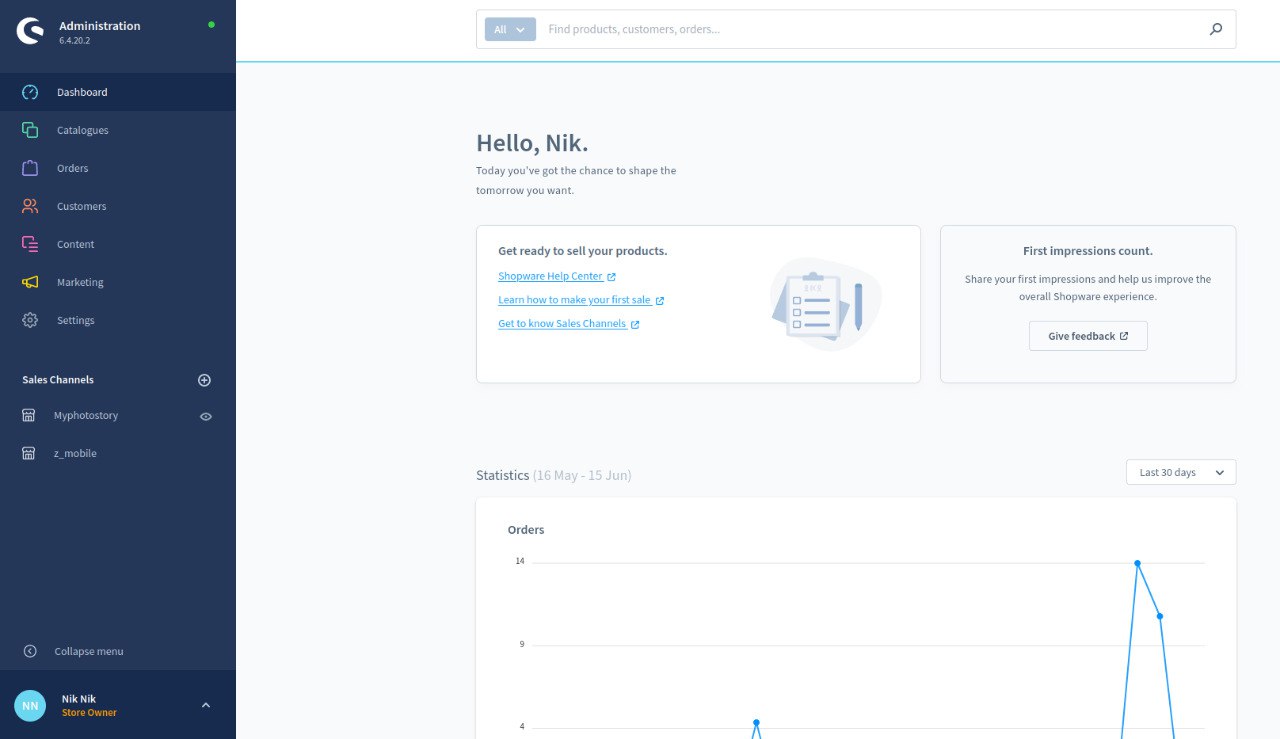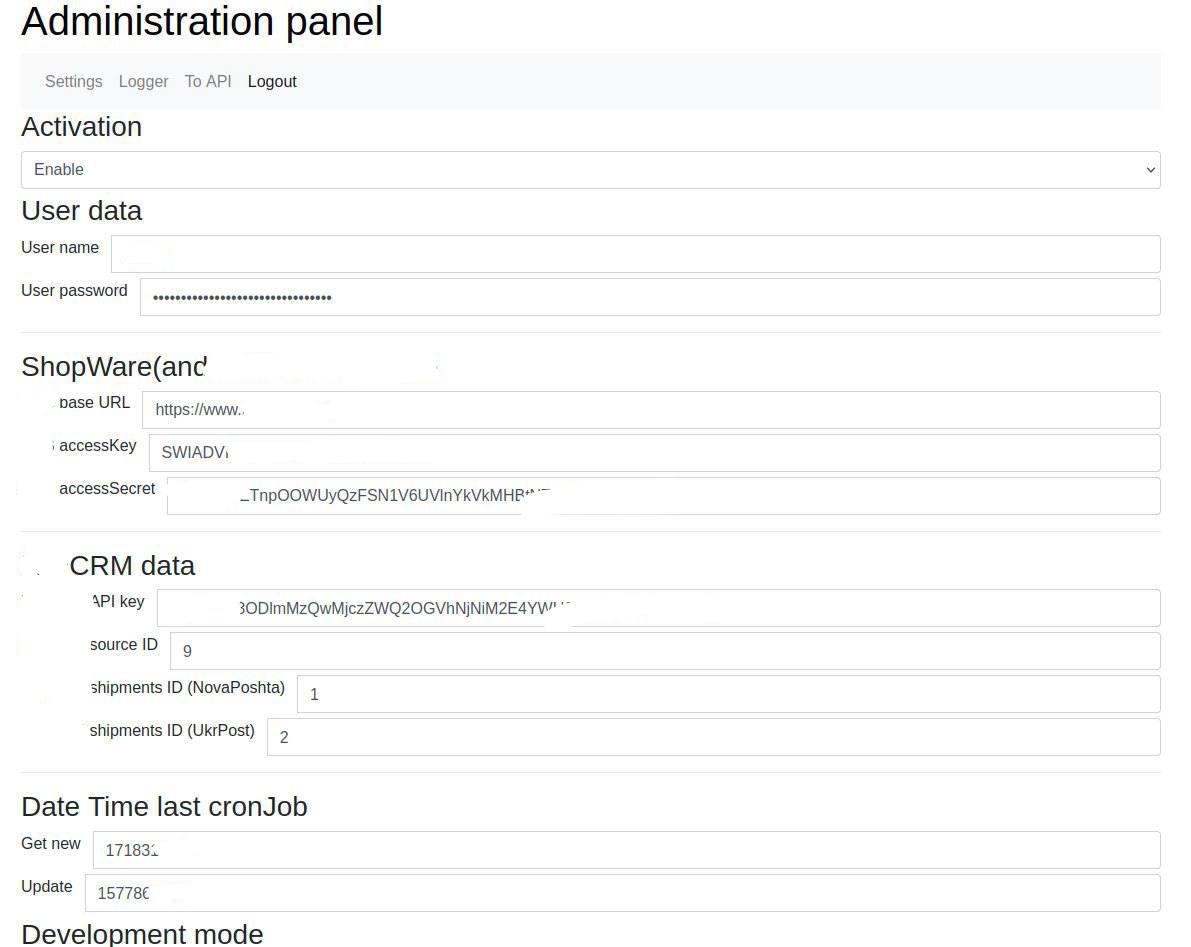Prehistory
We have been working with Denis for a long time.
So long that one of our employees, working in the previous company, worked with his projects.
We constantly received a lot of tasks from him where we had to fix some problems.
Examples of tasks from past projects: repairing the js constructor, improving the design, and other edits.
His tasks were mostly in the Drupal CMS.
_
But today we're not talking about those projects.
The client came to Shopware with a layout problem. Or rather, with some software written on the basis of it.


Main features of Shopware
- Flexibility and modularity:
- The platform allows you to customize stores according to individual business needs with the help of numerous plugins and applications.
- You can choose from a variety of options, from standard features to customized solutions.
- Design options:
- Offers responsive templates and tools to create a unique store design.
- Supports integration with modern web design technologies, ensuring high-quality display on various devices.
- Multichannel sales support:
- Allows you to manage sales across multiple channels, including your online store, marketplaces, social media, and more.
- Integration with platforms such as Amazon, eBay and others.
- Scalability:
- It is suitable for both small and medium-sized enterprises, as well as for large corporations that need advanced capabilities and high productivity.
- Can serve both simple stores and complex multi-language and multi-currency platforms.
- SEO support:
- Built-in search engine optimization tools help improve your store's visibility in search engines.
- Support for setting up meta tags, SEO-optimized URLs, integration with Google Analytics and other tools.
- International sales:
- It supports multiple languages and currencies, making it convenient for conducting international business.
- Includes options for setting up different tax rates and shipping methods.
- Security and Support:
- The platform provides high data security, regular updates and support.
- There are integration options with various payment gateways to ensure secure transactions.
Advantages of Shopware:
- Open platform: The open source platform allows developers to create custom solutions and extend the functionality of the store.
- Community and Support: An active community of users and developers who provide support, share plugins and templates.
- Integrations: Support for numerous integrations with CRM, ERP, accounting systems and other tools, which facilitates the management of business processes.
Shopware is used to create and manage various online stores, from small boutiques to large corporate sites. The platform is popular for its flexibility, scalability and advanced customization options.
GetPrintBox
The simple version of ShopWare is not suitable for the client, as he is interested in more advanced functionality. Thus, some system was chosen, with more advanced and suitable functionality.


Tasks and solutions
So, we were given tasks. One of them was typesetting. After receiving the design in Figma, we started adapting the layouts for further use on different devices. The design required a careful approach to detail, as each element had to correspond to the designers' intention and provide an optimal user experience. Using mockups, we created HTML structure and applied CSS styles to ensure the final product matched the visual concept. We paid special attention to adaptive design so that the pages are displayed correctly on different screen sizes.
After that, the process of integrating design with dynamic content began. Our team of integrators ensured that all functional elements such as forms, buttons and navigation menus worked flawlessly and met the functional requirements of the project. After the basic layout was completed, we ran several rounds of testing, checking the performance and compatibility of the design on different platforms and browsers. The test results allowed us to make the final adjustments to provide users with a user-friendly and aesthetically pleasing interface.
Process automation
The main task was process automation.
Automating the business of an online store using CRM (Customer Relationship Management) systems is the key to increasing efficiency and optimizing work. It allows you to integrate all aspects of interaction with customers into a single platform that provides centralized management of orders, marketing campaigns, customer service and analytics. CRM systems automate routine processes such as order processing, inventory management, and accounting for financial transactions, which allows you to cut costs and reduce the number of errors. As a result, businesses can quickly respond to changes in demand and implement personalized marketing strategies based on data about customer behavior.
The implementation of CRM in the business processes of an online store also contributes to the improvement of customer service. CRM systems allow you to create a complete profile of each customer, including purchase history, preferences, and interactions with support. This enables personalized recommendations and improves the relationship management process. Thanks to automated reminders and notifications, the system helps to follow up on customer requests in a timely manner and quickly solve their problems. In addition, CRM integration with marketing tools allows you to more effectively conduct campaigns through email, social networks and other channels, improving customer engagement and increasing retention. This comprehensive solution not only optimizes operational processes, but also contributes to increasing customer loyalty and increasing profits.
CRM is a system that provides tools for managing customer relationships and automating business processes, particularly in the field of e-commerce. It helps businesses efficiently process orders, manage inventory, implement marketing campaigns, and maintain a high level of customer service.
The main criterion when choosing a CRM system is that it is convenient and the country of origin is Ukraine. But the choice was made before us)
So, we have an online store and an already implemented CRM. The task is to upload orders to CRM, upload changes in orders to CRM, thereby ensuring the relevance and consistency of data between systems. For this, the CRM API is used, which allows you to automatically transfer all new orders from the online store to the CRM in real time. When a customer places an order, the API creates a corresponding record in the CRM, including all the necessary details: information about the products, the customer, the delivery address and the payment methods. This ensures centralized data storage and simplifies further order processing, including logistics and customer communication.
In addition, the CRM API integration allows you to automatically upload changes in orders to CRM, which is especially important for maintaining up-to-date information. For example, if the customer changes the delivery address, chooses a different payment method or adds items to the order, these changes are instantly updated in the CRM. This reduces the chance of errors and omissions that can occur during manual data entry. Also, the API allows you to automate the processing of order statuses: after sending the product to the client, CRM automatically updates the status to "sent", and after receiving it - to "delivered". This enables the team to quickly respond to customer requests, monitor processes and provide a high level of service, increasing the efficiency of online store management.
CRM API integration also provides opportunities for further analysis and improvement of business processes. Data on orders and their changes are collected in CRM, which allows you to analyze trends, identify popular products, monitor the effectiveness of marketing campaigns and forecast demand. This provides better information and facilitates informed decisions about inventory management, pricing policy and sales strategy. In general, the integration of an online store with CRM via API is an important step to optimize processes and improve customer interaction.
